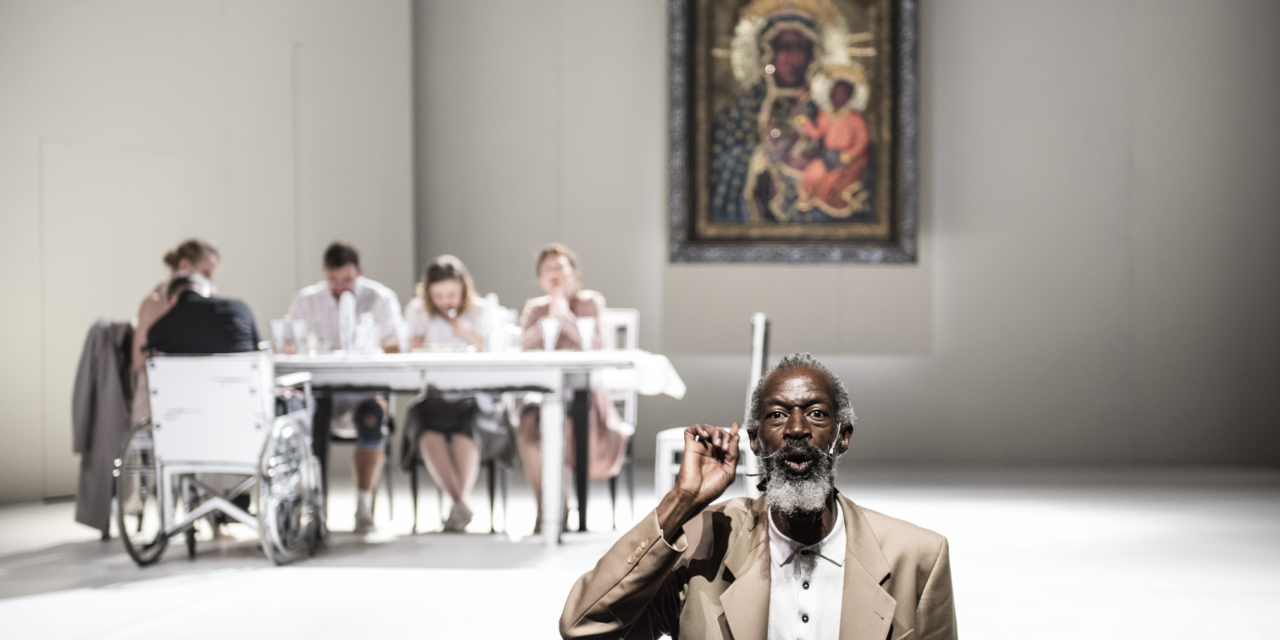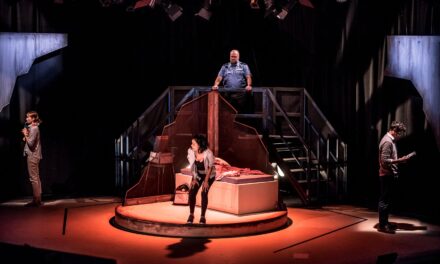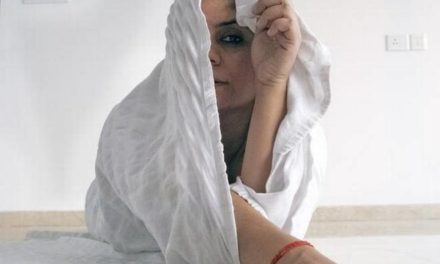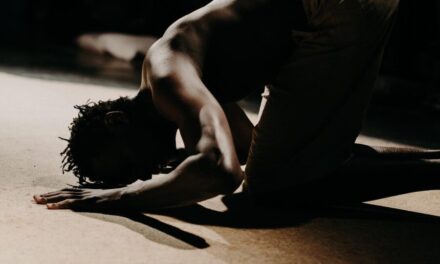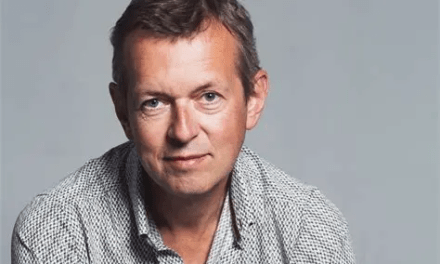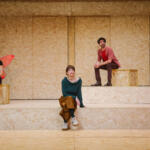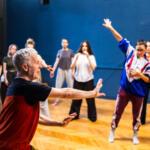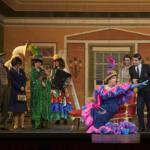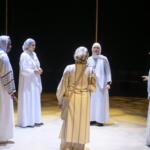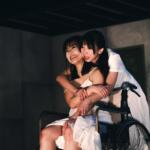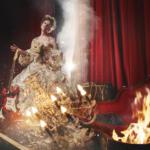Monika Kwaśniewska: What is your educational background in the arts? Did you graduate from drama school in Senegal?
Mamadou Góo Bâ: I wasn’t at drama school. I learned through practice. I liked the theatre very much, especially radio drama. I was very interested in it. Together with my brothers and sisters, I created radiophonic plays. I directed my own plays, which were always inspired by our lives. I had a teacher in primary school who organized theatre performances at the end of the year.
Later, when I was a teenager, at the turn of the 80s, I was part of a theatre group working under the auspices of an arts and sports association. This led me to read many interesting books about theatre and texts for the stage. We wanted to make plays about our neighbors’ problems and at the same time organize a kind of celebration. There are drama schools and a National Theater in Senegal, but back in the day they put on the classics like Molière. Plus, they did it in French. We wanted to communicate with people who live in Senegal, many of whom do not understand French.
MK: What topics did you address?
MGB: We were interested in people’s lives, so we explored a variety of issues such as living together in a flat or area, sickness and the national health service. We wrote the texts ourselves. Classic literary works were out of synch with our life and times.
MK: Who watched these plays?
MGB: Admission was free. We performed in the squares. We built our own arena using wet sand, tarpaulins, wood; we had sound speakers. This required a lot of creativity. We had no money for better technical solutions. We would announce a performance a few days before the event. The audience were seated on chairs (which were rented too) and did not take part in the show. There were always many children in the audience.
MK: Did anyone act as a director?
MGB: There were about thirty of us, so there was always the problem of finding a job for everyone. I directed and wrote the texts. There were also people who took care of the organizational side, although everyone was involved in this to a greater or lesser extent. We raised the money ourselves ‒ each of us would pay a “membership fee,” but contributions also depended on individual circumstances. After the group’s dissolution, some of its former members still wanted to do theatre. We started a theatre and music group, but this time around we wanted to earn money.

Jak ocalić świat na małej scenie (How to save the world on a small stage). Directed by Paweł Łysak. Powszechny Theater, Warszawa. Photo by Magda Hueckel.
MK: When did you leave Senegal and why?
MGB: I met a Marseille-based artistic group, La Fabriks (LFKs), led by Jean Michel Bruyère. They were giving creative, theatre and music workshops for young people in Senegal… We too, in conjunction with the same foundation, were carrying out a project with troubled youth. We were to join forces and choose two people from our group to take part in a joint project. I did not want to do that, but one of the people we chose fell ill and I took their place.
I knew by then that Jean Michel Bruyère was doing very interesting things. My dream was to combine a number of different art forms. The project Impressions de Pikine (Pikine, where I grew up, is a fifteen-minute drive from Dakar in the Cape Verde region) gave me the opportunity to make this dream come true. I always liked to draw ‒ I made drawings on the walls, portraits of friends and siblings. I also loved to sing. I was active in various fields, but my colleagues advised me to choose one thing and stick to it: just make music, just draw or just write. But even during my work at the arts and sports association, we wrote lyrics, arranged music and integrated dance and slide projections. The underpinnings of multimedia work were laid down at the time, but it was not until we started working with Jean Michel Bruyère that we could take it to a new level, because we had the tools to implement these ideas well.
When the project ended, I was offered to work on another show in Senegal and I agreed. The production we made was invited to Switzerland, then to France… La Fabriks has many studios where shows are produced. And so my journeys began.
MK: You were with La Fabriks for many years…
MGB: During my journey with La Fabriks I was involved in some projects, but not all of them. The company is like a family to me, and we don’t always work with our sisters or brothers in a family. I did various jobs in it, depending on what skills and abilities we needed: sculpting, dyeing, calligraphy, sweeping, vacuuming… At the start, everyone, from principal artist to administrator, sweeps, loads trucks, sews… Everyone is involved. No job is less worthy than another. Hammering a nail is as important as thinking, writing, singing, performing. I assigned myself the role of helping with all La Fabriks activities.
MK: What kind of artistic projects were you involved when working with La Fabriks?
MGB: Extremely diverse and hybrid. When we did a project about refugees, Le Préau d’Un Seul, which was shown, among other cities, in Berlin, Avignon and Linz, the action took place in a large, nine-meter-high military tent, set up on a roof. In other spaces of the building on which the tent was installed, we placed smaller tents, sculptures, calligraphies. There was also a real doctor, a real cook preparing food, a real stylist who selected clothes for the protagonist… From beginning to end, there was one lone person in the roof tent, Der Hoff. The audience walked past him to observe other artistic actions. The event lasted all day. It had a fixed structure. During each performance some actions were performed in a loop. We had to take great care of the condition of the tent ‒ if it had become perforated or draughty, it could have got cold inside, and we stayed in the tent the whole day. We set it up ourselves ‒ it was hard work.
It wasn’t a theatre piece but a series of events, a preparation of life. Some theatre festivals did not want to invite us because of the hybrid nature of the project.
MK: What influence did you have in your own actions? Did the director dictate what to do?
MGB: Jean Michel Bruyère is a designer, a philosopher, a man active in a variety of creative fields, even those related to new technologies. He does everything to ensure that his projects and actions have a useful influence on the functioning of the company. When someone explains what he expects from me and I accept their suggestions, I believe it’s normal that they give me instructions how to implement their projects, which are preceded by long-term research, reflection and conversations.
MK: How did you end up in Poland?
MGB: I came here because of my wife. She had lived in Senegal for ten years before we met. After the wedding, I was often away which was a real problem. We agreed to move to Poland, because it is a good “jumping-off point” for me. In Senegal, when I wanted to go to France, I had to have a visa, so when I was working on a project, I didn’t come home for the duration of it, which could last up to four months.
MK: Do you still work with La Fabriks?
MGB: I’ve worked with them two or three times since I settled in Poland. In 2019, Jean Michel Bruyère worked at the Nowy Theater, where he led workshops as part of the Summer Camp ‒ I worked with him too.
MK: How did you get to work for the Powszechny?
MGB: First, I was a waiter here and I worked with Strefa Wolnosłowa [Free Speech Zone] ‒ I took part in a number of theatre events. When Strefa came to the Powszechny, Paweł Łysak saw me in a few performances and asked if I would like to work with him. I agreed of course, because I was looking for a permanent job I would like to do. I got a part-time position.
MK: I understand that this is your first permanent job in the theatre.
MGB: Yes, La Fabriks functions on a project-to-project basis. I really liked the freedom I had at the time.
MK: Do you feel limited at the Powszechny?
MGB: No, I don’t feel pressure here. I perform in plays, but I’m always free to do other things, like playing concerts. I keep trying to figure out how to find time for everything and to plan it well, because the repertoire is untouchable. Nobody at the theatre minds that I do other things. Just the opposite, I exhibited my work at the show of work by foreign artists based in Poland, held as part of the Warsaw Biennale, thanks to the fact that I work with the Powszechny. The curator, Janek Simon, designed the sets for Jak ocalić świat na małej scenie [How to Save the World on a Small Stage], helmed by Paweł Łysak. While working on this show we would tell many personal stories. This is how Janek Simon found out about my artwork. The theatre saw my participation in the exhibition as a chance to promote itself.

Jak ocalić świat na małej scenie (How to save the world on a small stage). Directed by Paweł Łysak. Powszechny Theater, Warszawa. Photo by Magda Hueckel.
MK: The exhibition explored, among other things, the difficult situation of foreign artists living in Poland. Was this your experience too?
MGB: Yes, I faced difficulties early on. I had no formal right to work until I obtained the required documents. This is not just a problem of artists, I think. But I could be active, work outside Poland, with La Fabriks and others. Besides, I was invited as a guest artist to the Lubuski Theater in Zielona Góra. It was a great experience, because we staged high-quality texts written by female prisoners, their poignant stories, under the guidance of Łukasz Chotkowski.
I could give concerts, perform in plays, think and create, write. I could do things which sometimes made people happy. When others are happy, so am I.
MK: I suspect that you are the only actor at the Powszechny Theater who is not a drama school graduate.
MGB: Americans say that practical skills are much more important than degrees. At some point, even those who used to put much store by degrees started working with untrained actors because they knew they were more open, less formulaic. They do not know the rules that block some professionals. This is valuable and important for directors who look for something new in the theatre.
MK: Do you see the difference between yourself and the rest of the ensemble of the Powszechny Theater?
MGB: This is a difficult question. I don’t know what it means to be an actor. Are you an actor if you are a drama school graduate? If you are familiar with Brecht’s or Artaud’s theories? With the tenets of Grotowski’s and Kantor’s actor training? (I particularly like the latter’s concept of acting.) I don’t know whether I am an actor, musician or calligrapher. I think that it is other people who need to find a name for who I am and what I do. For me, the most important thing is what we convey from the stage, what we say from it about society.
MK: Are your roles creations or do you speak from the stage on your own behalf?
MGB: It’s always an artistic creation, but it is very closely linked to life.
MK: Do you have any say in which plays you are cast?
MGB: No, but I like the repertory line of the Powszechny Theater. If I were to play in a play I disagree with, I would protest. It has not happened yet. I may disagree with some details, but when I see that it’s just some elements of a bigger picture, it’s not a problem. I’ve been more invested in the themes of some plays, less in others. I was grateful I could play in Mein Kampf. I knew that Jakub Skrzywanek, even though he is very young (he is probably the youngest director I have worked with), had a vision of how to present it, that he would not stage Hitler’s text to promote Hitler’s idea but to expose it, analyze it, confront it with today’s reality. Together with playwright Grzegorz Niziołek, Skrzywanek uses Hitler’s words but at the same time subjects them to ideological critique. They get us to interrogate the nationalist and fascist ideas and their sources. People who are oppressed, for example in an economic sense, rebel and often take up extreme ideologies. The present situation in Poland is similar in many aspects. Deficits are politically instrumentalized. In order to avoid history repeating itself, we have to go back to history, draw lessons from it and take concrete actions. Some people, though, became riled at the idea, even before they found out what it was about.
MK: Did you read Mein Kampf earlier?
MGB: I read a French translation before our first meeting at the theatre.
MK: What work models did you encounter at the Powszechny?
MGB: Everyone is very critical. The actors are very highly regarded here ‒ like stage designers and directors. Everyone talks about the idea of the shows that are being produced, everyone has a say. When I get a role, I, too, look for inspiration myself, exploring the subject on my own to understand more and to think about how to anchor the subject.
MK: You have worked with Maja Kleczewska, Weronika Szczawińska, Paweł Łysak, Kuba Skrzywanek, Krzysztof Garbaczewski. Was working with each of them as team oriented as you said?
MGB: I don’t like comparing directors. Everyone has different working techniques. I listen to directors because I trust that their concept of the play is more deeply considered than mine. They have invested more time thinking about it than I have. It’s better to discuss doubts after a scene is acted out than to stop action or discuss something that hasn’t been tested in practice. If we rehearse a scene and I do my best to make a director’s solution work, but it doesn’t, I suggest that we look for another one. If the director asks my opinion, I answer honestly. Experimenting together does not necessarily involve a role reversal. I am an actor, someone else directs. The actor has no external perspective, he doesn’t see the big picture for an action.
MK: The director of Divine Comedy, the latest show you play in, Krzysztof Garbaczewski, is said to give much leeway to his collaborators. What did the rehearsals for the play look like? Did you start with Dante’s work or with other inspirations? Did Garbaczewski give precise instructions. Did he say what he expected?
MGB: I think he was very keen for actors to take a participatory attitude. We had a diverse reading list. Before Dante, we read Yuval Noah Harari’s Homo Deus, William Gibson’s Neuromancer (a 1984 novel presenting a vision of true hell in a future world, where man and machine become one), many articles… Fortunately, I managed to find almost all of the books and articles in French. My improved understanding of the subjects gave me more freedom. We also had the pleasure to attend screenings of interesting films. But, of course, everything was linked to the themes of our further work.
MK: What were these subjects?
MGB: I most resonated with the subjects of life, love and death, which underpin Dante’s text. After all, he wrote it after Beatrice’s death, which led to Dante’s mental crisis and then to his conversion.
MK: Did you read and discuss Divine Comedy, or did everyone find their own thread to follow in this thematic and textual space?
MGB: It was a continuous process, which involved reading, asking questions, making suggestions. Rehearsals were held in the rehearsal room and then at the home of DAS (Dream Adoption Society). Some were better, some worse. Everything became clear when we could finally move to the big stage. Garbaczewski is a keen observer. I feel that he offered me my role after he saw my attitudes and actions at the preparatory stage.
MK: Your presence in the show is closely linked to the music. How was it created?
MGB: Divine Comedy is like a chanson de geste, which minstrels and bards would sing while leading adventurous lives. Our presence in the show is closely connected with music. Composer Jan Duszyński was present at the rehearsals: he listened, observed, made suggestions. I love using my voice, so I, like others, gladly followed his tips. Just before the opening, the director found several recordings of Leśmian’s poems, which we had made for an earlier, abandoned project. They came back as mandalas in this play. They were in keeping with the constantly rotating stage, setting the rhythm for gentle transitions from Hell to Paradise through Purgatory. The show is in a constant flux, it’s different every day. Just like people.
MK: Do you feel that your skin color and cultural differences are a factor in the repertoire of roles that you are offered?
MGB: No, I don’t. The roles I play are very diverse, so I don’t see any problem here. Lawrence w Arabii [Lawrence in Arabia] examines the situation of refugees in Poland, but I don’t play a refugee. We spoke different languages, but I myself spoke Polish. My character has power over others… In Jak ocalić świat na małej scenie [How to Save the World on a Small Stage], I tell the life story of my father, like the other actors, with our narratives addressing different ways of acting to ‘save the world’, as expressed in the title, regardless of nationality or skin color. In Mein Kampf I speak, among other things, about poverty and hunger ‒ these problems are quite common too. At the National Opera, I was a dancer in Maja Kleczewska’s Głos ludzki [Human Voice]. I played Death wearing white clothes and covered in white clay. No, I don’t feel limited or locked in a cliché or stereotype.

Lawrence z Arabii Lawrence in Arabia Directed by Weronika Szczawińska. Powszechny Theater, Warszawa. Photo by Magda Hueckel.
MK: Is this problem ever thematized during rehearsals by the creators and actors (e.g. in order to avoid stereotypical representations). Is it discussed with you?
MGB: Not that I know of. Or I don’t remember. Fortunately, I do not know everything about cultural life in Poland. One thing’s for sure, people all over the world ask questions about their own existence. As new technologies develop, we are ever more aware that we are not alone in the universe and that each of us is responsible for ourselves and the world.
MK: What do you think of the Accord [Porozumienie] at the Powszechny Theater?
MGB: I like this initiative very much. It gives a platform for the exchange of opinions between actors, directors, technicians, management and administrative staff who all have a different perspective on the situation in the theatre and work in it. The exchange of information between the artistic and technical teams is very important. Directors need to know what equipment they can use before they start working on a concept.
MK: Aren’t you afraid that too many opinions may paralyze the work of the theatre? Just like they can paralyze action during a rehearsal.
MGB: I don’t think that’s going to happen. If there is disagreement, there will be a discussion, and the final say will be with the directors.
This article was originally published in Polish by Didaskalia. Theater Journal 2020, no. 156. It was translated into English by Didaskalia and TheTheatreTimes.com and reposted with permission. The translation was supported by Polonia Aid Foundation Trust.
Didaskalia is now an open-access journal. The frequency remains unchanged and they will continue to appear bimonthly.
This post was written by the author in their personal capacity.The opinions expressed in this article are the author’s own and do not reflect the view of The Theatre Times, their staff or collaborators.
This post was written by Monika Kwaśniewska.
The views expressed here belong to the author and do not necessarily reflect our views and opinions.

